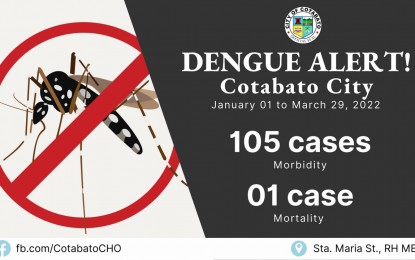
Infographic courtesy of the Cotabato City Health Office.
COTABATO CITY—Dengue cases here have increased by as much as 37% from January to March this year compared to the same period in 2021, claiming at least one fatality.
In a statement Thursday, Dr. Meyasser Patadon, City Health Office chief, said there have been 105 dengue cases with one death from January 1 to March 29 this year.
“This is 37 percent higher compared to the same period last year when the city health office recorded only 22 cases,” Patadon said, citing data from the City Epidemiology and Surveillance Unit (CESU).
As of Thursday, Patadon said 98 dengue patients are admitted to various hospitals in the city.
Frequent rains in the past few days have increased the possibility that clogged drainage canals in the city have turned into breeding sites of dengue-carrying mosquitoes, he said.
“Stagnant waters in surroundings, old tires, roof gutters, overhead water tanks and receptacles on slabs, and in small and large containers could also be breeding grounds of infected mosquitoes,” he added.
The dengue virus is spread to people through the bite of infected Aedes aegypti mosquitoes. The mosquito can be recognized by white markings on its legs and a pattern in the form of a lyre on the upper surface of its thorax.
The most common symptoms of dengue fever are nausea, vomiting, rashes, aches, and pain such as eye pain, typically behind the eyes, muscle, joint, or bone pain, and rashes.
“Please practice the 4S strategy for the safety of your own families and your communities,” Patadon said.
The four “S” campaign stands for: Search and destroy mosquito-breeding sites; secure Self-protection measures like wearing long pants and long-sleeve shirts and daily use of mosquito repellent; Seek early consultation; and, Support fogging or spraying only in hotspot areas where an increase in cases is registered for two consecutive weeks to prevent an impending outbreak. (PNA)
